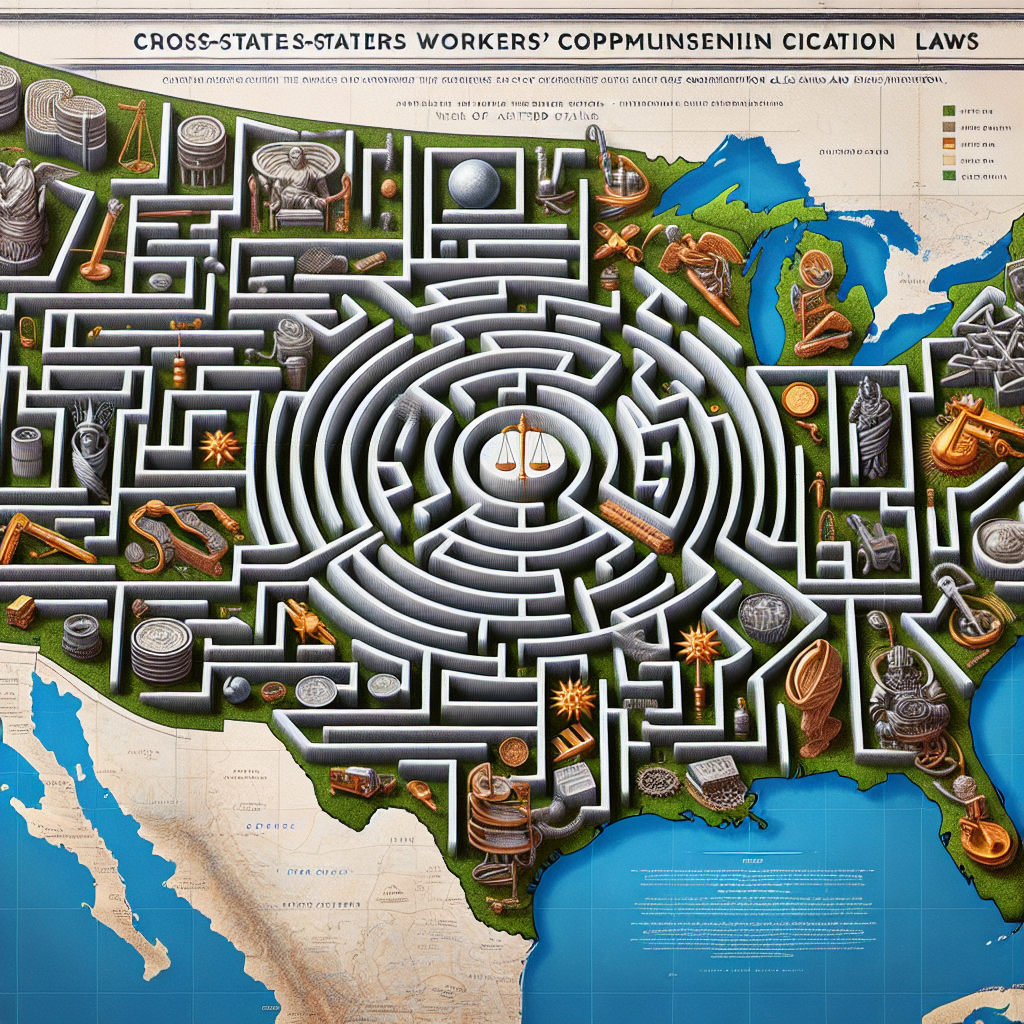Understanding the Basics of Cross-State Workers’ Compensation Claims
Cross-state workers’ compensation claims can be complex, often presenting unique challenges due to differences in state laws and the need to determine jurisdiction. This section will help you understand the basics of these types of claims.
Significance of Jurisdiction in Workers’ Comp Claims
Jurisdiction plays a critical role in workers’ compensation claims. Determining the right jurisdiction is crucial as it establishes the applicable laws for the claim and sets out the benefits an injured worker is eligible to receive. Typically, jurisdiction can be based on where the injury occurred, where the employment contract was entered into, or where the employer’s principal place of business is located. Nevertheless, multi-state employers must be aware that employees may have the right to file claims in more than one jurisdiction.
The Variation of Workers’ Comp Laws Across States
One of the major challenges with cross-state workers’ comp claims is dealing with the variations in laws across different states. Each state has its own unique laws regarding workers’ compensation, including specifics about which injuries and illnesses are covered, the benefits provided, and the process for filing a claim. These conditions can drastically influence the outcome of a claim and the benefits an employee receives. It is important for both employees and employers to be knowledgeable about the specifics of workers’ compensation laws in the relevant jurisdictions.
Implication of Extraterritorial Provisions in Cross-State Claims
An additional complexity encountered in cross-state workers’ comp claims is the application of extraterritorial provisions. These provisions allow employees who are injured while temporarily working in another state to file a claim in their home state. However, conditions surrounding these provisions can vary widely, creating additional layers of complexity to the claims process. Understanding and navigating these extraterritorial provisions is instrumental in ensuring the injured worker receives appropriate compensation and that the employer meets all legal obligations.
The Legal Complications Associated with Cross-State Claims
Understanding Jurisdictional Quandaries in Cross-State Claims
In the context of workers’ compensation, legal complications often arise due to jurisdictional issues involved in cross-state claims. Such disputes may occur when an employee gets injured while working in a different state from the one where their employer is based. The question of which state’s laws apply can turn into a complex matter. It is predominantly determined by factors such as the location of the injury, state of employment contract, and principal place of employment.
Discrepancies in State-Specific Laws
The legal complexities become even more intricate owing to discrepancies in laws between states. Every state has its unique set of rules regarding workers’ compensation, which varies significantly from one state to another. For instance, some states have stringent statutes of limitations for filing workers’ comp claims, while others may offer more comprehensive benefits. Due to such differences, it can lead to conflicts over which state’s regulations should govern the case, adding a layer of complication to these claims.
The Role of Court Decisions and Precedents
Court decisions also play a crucial role in shaping the legal landscape of cross-state workers’ compensation claims. When faced with such cases, judges interpret the laws and apply precedents, creating litigation outcomes that can influence future similar cases. For example, courts might look at previous cases to determine if a particular state has jurisdiction over a worker’s injury that occurred in another state. These decisions can significantly influence the handling of cross-state claims and contribute to their complexity.
In these scenarios, it’s worth noting that while conflicting laws and court decisions add to the confusion, consultation with experienced legal counsel can significantly help navigate this complicated terrain. The challenge remains to ensure that workers receive fair compensation irrespective of where the injury occurred, and employers comply with the legal obligations set out by respective state laws.
Methods for Navigating Jurisdictional Challenges in Workers’ Comp Claims
Understanding Jurisdictional Rules
The first method for navigating jurisdictional challenges with workers’compensation claims is to have a thorough understanding of jurisdictional rules. Regardless of where an employee resides or where the injury occurred, it’s essential to understand the laws governing workers’ compensation in the state where your company is based. If a claim arises that involves multiple states, understanding their respective laws will be critical to appropriately managing the claim.
Collaborating with Legal Experts
Navigating through jurisdictional issues in workers’ compensation claims can often be complex and confusing, primarily when claims involve multiple states. Seeking advice from legal experts specializing in workers’ compensation laws and interstate claims can significantly simplify the process. These professionals can help interpret statutes, guide proper filing procedures, and advise on possible benefits and potential pitfalls.
Leveraging Technology
Technology can play a pivotal role in managing cross-state workers’ comp claims. Modern software provides features that allow employers to track claims, maintain records, and generate reports, all of which can be crucial in handling jurisdictional issues. More importantly, technology can be used to verify claim details, determine liability, calculate benefits, and predict outcomes based on past claim data. By adopting suitable technology, employers can ensure compliance with different state laws and improve their ability to manage multi-state claims.
Risk Management Strategies for Cross-State Workers’ Comp Claims
Understanding Multijurisdictional Laws
A robust understanding of multijurisdictional laws serves as the basis for managing cross-state workers’ compensation claims. Each state has its own policies and procedures concerning workers’ compensation, liability limits, and available benefits. Some states might recognize claims from accidents that happen out of state, while others may not. Hence, it’s crucial to familiarize oneself with both the laws of the employee’s home state and the state where the incident occurred, to ensure compliance and proper claim processing.
Procuring Out-of-State Insurance Policies
One technique for reducing risks associated with cross-state claims is procuring out-of-state insurance policies. These provide coverage for workers who get injured while operating in another state other than their primary workplace. When businesses operate in multiple states, having a single workers’ comp policy that only covers one state might leave them exposed to claims that arise in other states.
Seeking Legal Counsel
The complexities involved in handling cross-state workers’ compensation claims can be overwhelming. Therefore, seeking counsel from experienced workers’ comp lawyers is an effective risk management strategy. Attorneys well-versed in these types of claims can advise on jurisdictional issues, interpret state laws, and help navigate any disputes that may arise during the claims process.
Investing in Employee Training and Safety Measures
One proactive way to manage these risks is by investing in employee training and safety measures. An environment that prioritizes safety reduces the likelihood of workplace accidents, decreasing the potential for compensation claims. Training should inform employees about safety protocols, the use of protective gear, and other preventative measures. Regular risk assessments can also help in identifying potential hazards and implementing necessary modifications.
Remember, the goal is to limit claims and potential disputes, ensuring a smoother, more efficient claims process. A combination of knowledge, proactive measures, and professional assistance can help achieve this when dealing with cross-state workers’ comp claims.
Future Outlook: Adapting to New Changes in Cross-State Workers’ Comp Laws
Navigating an Evolving Legal Landscape
It’s important to understand that the legal landscape surrounding workers’ compensation for cross-state employees is always changing. Laws and regulations differ from state to state, which can potentially lead to confusion and disputes over jurisdiction. Employers, employees, and legal professionals must stay current on these changes and adapt their strategies accordingly.
In recent years, several states have made amendments to their statutes, resulting in notable changes in how workers’ compensation cases are being handled. For instance, some states have expanded the coverage of their laws to include out-of-state employers having operations within their borders. Employers are now more accountable for workers’ compensation coverage than before, making it essential for them to monitor these developments closely.
Innovations in Legal Technology
As the complexity of cross-state workers’ comp claims increases, innovations in legal technology can provide tools to help manage these challenges. Automated systems can track and monitor claim statuses, facilitate communication between different jurisdictions, and ultimately streamline the entire process.
Investments in artificial intelligence and big data analytics are rapidly transforming traditional methods of handling workers’ compensation issues. Utilizing these technologies can assist in predicting potential risk areas, identifying fraudulent claims, and reducing overall costs associated with cross-state claims. Legal tech solutions will continue to play a significant role in coping with jurisdictional challenges arising from workers’ comp laws.
Promoting Worker Rights and Protection
The shifting landscape of cross-state workers’ comp laws also carries implications for worker rights and protection. As jurisdictions redefine their laws, it is critical to ensure that worker rights are not undermined. For businesses, maintaining the balance between legal compliance and employee protection is key to avoiding potential legal pitfalls and upholding their corporate social responsibility.
There’s a growing recognition among lawmakers that current legal systems may need updating to better accommodate today’s increasingly mobile workforce. Ensuring that workers are adequately covered, no matter where they perform their duties, will continue to be a central element of future discussions around workers’ comp laws. Changes in legislation must aim for a harmonious blend of employer and employee interests while maintaining fair compensation and protection for cross-state workers.



